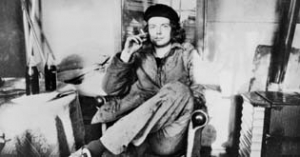Summary
Who's Afraid of the Bogeyman
Portrait of a private coal company in East Berlin's Prenzlauer Berg district in 1988/89. The feisty woman boss runs the business with humour and understanding. Her seven male employees respect her. To the outside world, they are all tough guys, but as they describe their jobs and personal situations, above and beyond the hard manual labour, their vulnerability starts to come to light. Under gentle questioning, the subjects of this social survey by Helke Misselwitz willingly allow the audience a "look into their hearts": "Can hands this rough be tender?" That approach makes it seem, at times, as if this were a utopia of solidarity at the margins of the Socialist workers' state. Looking at these figures "from below", the film touches on many taboos. The discussion subjects range from the building of the Berlin Wall and possible escape, to child abuse and suicide, as well as prison and alcoholism. Fiercely intent on authenticity, which is why it was shot in "outmoded" black-and-white, the film documents a trade that would soon itself become obsolete – turning it into a survey of social contradictions in East Germany, made just a few months before the country’s political collapse.
Source: 69. Internationale Filmfestspiele Berlin (Catalogue)

Comments
You have seen this movie? We are looking forward to your comment!
Login or register now to write a comment.
Der zweite Tabubruch ist ein Stück Berliner Mauer an der Gleimstraße, um zu dokumentieren, warum die private Holz- und Kohlenhandlung Uhle, seit 1922 im Familienbesitz, 1961 umziehen musste. Die resolute Chefin Renate Uhle kennt jeden Kunden persönlich, auch die 86-jährige Frau Neumann, die zum kurzen Plausch vorbeikommt auf dem Weg zum Canasta-Spiel im Kreiskulturhaus „Prater“ an der Kastanienallee. Renates Gatte kommt kurz ins Bild: nach einem Schlaganfall ist er seit einigen Jahren arbeitsunfähig.
Weshalb sich die Chefin umso mehr auf ihre Männer verlassen muss, die sie im Aufenthaltsraum mit knappen Charakterisierungen und Berliner Schnauze vorstellt. Klaus Leube etwa, große Klappe, aber immer pünktlich. Oder Karl-Heinz Bartz, genannt „Kalle“, der ein bisschen launisch sei, aber auch ein guter Arbeiter. Oder Manfred „Manne“ Gabbert, ein gefährlicher Aufwiegler in der Truppe der Kohlemänner und sein genaues Gegenteil, Rainer „Knöpfchen“ Schulze, ein vergleichsweise schmächtiger Kerl, aber immer zuverlässig und vor allem ein großer Kumpel. Erwin, genannt „Schweinemörder“, und Klaus Szymanek machen in Holz, können aber nicht so gut miteinander.
Renate Uhle sitzt selbstbewusst auf ihrem Schreibtisch und nimmt kein Blatt vor den Mund nach dem Motto „hart, aber herzlich.“ Ihre Tochter Manuela Perleberg soll das Geschäft einmal übernehmen, arbeitet aber nun schon 18 Jahre lang als Lehrerin und hilft nur ab und zu bei der Mutter aus. Sie beklagt sich bitter über die vulgäre Sprache der Kinder und hat dafür eine Erklärung parat: Den Eltern ist bewusst, dass sie zu wenig Zeit für ihre Kinder haben, weshalb sie ihnen zu viel durchgehen lassen.
Kohlen werden mit Kleinlastern zu den Kunden gefahren und in Säcken in entsprechende Kellerräume getragen – eine schweißtreibende Angelegenheit für gestandene Kerle, die einen von den häufig schon betagten Kunden traditionell offerierten Schnaps nur ablehnen, wenn Thomas Plenerts Kamera dabei ist.
Briketts werden, in Holzkisten zu Gebinden mit Tragegriffen geschichtet, mit einem tuckernden, „Dieselameise“ genannten Multicar M 21 vom VEB Fahrzeugwerk Waltershausen in Thüringen zu den Kunden zwischen Schönhauser Allee, Bornholmer und Eberswalder Straße in den Berliner Bezirken Prenzlauer Berg und Pankow gefahren. Und nicht einfach auf den Bordstein gekippt wie Kohlen, wenn sie unmittelbar durch kleine Fenster in die Keller geschippt werden können. Sondern in Keller getragen oder auch schon ‘mal bei Senioren in den vierten Stock neben den Küchenherd gestellt.
Die wie Seeleute tätowierten Kohlenmänner sind raue Gesellen, die nach Feierabend den Staub aus Mund und Kehle mit reichlich Mollen (halber Liter Bier) und Korn spülen, immer einen flotten Spruch draufhaben, im Gespräch mit der Dokfilmerin aber auch sensible Seiten offenbaren. Einer der Ausfahrer präsentiert sich mit Gattin und vier Kindern als stolzer Familienvater auf dem heimischen Sofa, aber private Aufnahmen bilden eher die Ausnahme.
„Wir überleben so langsam, so leise weinend“ bekundet die eloquente Chefin, die nach eigener Einschätzung schneller spricht als sie denkt. Da Ersatzteile für die 1989 längst nicht mehr hergestellte „Ameise“ kaum zu bekommen sind, legen ihre Arbeiter bei notwendigen Reparaturen selbst Hand an. So kurz vor dem Ende des Arbeiter- und Bauernstaates herrscht hier eine familiäre Atmosphäre, die in großem Gegensatz zum gesellschaftlichen Aufbruch „draußen“ steht.
Uraufgeführt Mitte Oktober 1989 beim 12. Nationalen Festival des Dokumentar- und Kurzfilms in Neubrandenburg ist „Wer fürchtet sich vorm Schwarzen Mann“ zunächst am 6. Dezember 1989 im Fernsehen der DDR erstausgestrahlt worden. Auf die Kinopremiere am 8. Februar 1990 unweit der Kohlenhandlung im Colosseum an der Schönhauser Allee folgte am 16. Februar 1990 der allgemeine Kinostart.
Pitt Herrmann